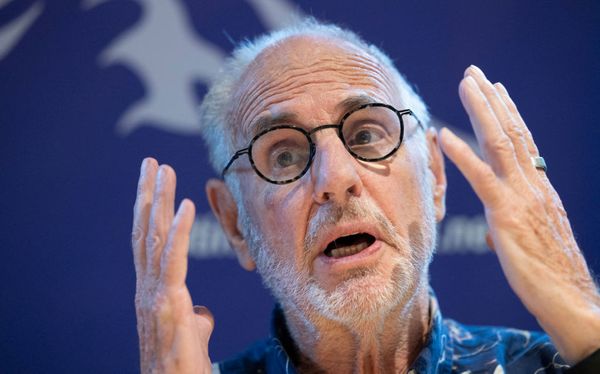In 1979, a young Jim Abbott told a reporter from his hometown newspaper that he wanted to become a Major League Baseball player. Many 12-year-olds have that dream — but that's where the similarities end.
In Abbott's case, it came true. And Abbott wasn't like the other boys: He was born without a right hand.
A native of Flint, Mich., Abbott already flashed his skills on the baseball diamond as a preteen. In high school, he excelled as a pitcher and also played quarterback for the football team.
"I played sports because that's what the boys of Flint did," he wrote in his autobiography, "Imperfect: An Improbable Life."
By his early 20s, Abbott had overcome his birth defect on a triumphant scale. At the University of Michigan, he helped his team win two Big Ten Conference championships. While in college, he won the James E. Sullivan Award as America's top amateur athlete. And he won a gold medal at the 1988 Olympics as a member of the U.S. baseball team.
The best was yet to come.
Build Up Accolades Like Jim Abbott
Abbott pitched in the major leagues for 10 years (1989-1999). In 1993, he tossed a no-hitter for the New York Yankees.
"Execution and performance are all about trust, and that game epitomizes the importance of trusting yourself," Abbott, 55, told Investor's Business Daily.
In his prior outing, Abbott lasted less than four innings against the same Cleveland Indians team that he was facing again. At 25, he was a heralded pitcher with more than four seasons under his belt. Despite a 1991 season in which he won 18 games and finished third for the Cy Young Award, the overall results were uneven.
"It was a pivotal moment for me," he said. "Being at a low point, being frustrated and struggling leading into that game, I needed belief and conviction to pull myself out of it."
Jim Abbott Innovates His Way To Success
Reflecting on his career, Abbott credits trust as key to his success. He trusted his teammates, coaches and even his scouting reports on each batter.
Perhaps most importantly, he believed in his catcher. That relationship proved especially vital during his no-hitter.
"I completely trusted (catcher) Matt Nokes," Abbott said. "His strategy, his focus, his intentions, his positivity. Before the game, he said, 'Don't get caught up in (sluggers) Albert Belle and Manny Ramirez. Trust your best pitch.' "
Unlike some athletes with preternatural gifts, Abbott worked hard to develop his skills. While he made his high school baseball team as a freshman, he didn't get a hit the whole season.
"Those early teenage years were perhaps my most difficult in terms of accepting my disability," he wrote.
Like many trailblazers, Abbott learned to innovate. Through constant experimentation, he practiced transferring his glove from his right forearm to his left hand quickly after pitching the ball. He'd use his glove to field balls in play, and then twirl the glove toward his chest so that he could free his left hand to throw out the runner.
He admits it took "a million tries and nearly as many clumsy failures" before he could play with one hand. He spent long hours throwing a baseball at a brick wall, figuring out how to field it.
Jim Abbott Inspires Kids With Disabilities
Fortunately, Abbott did not encounter many bullies as a kid. His schoolmates mostly expressed curiosity about his missing hand. Still, he experienced some taunting and became accustomed to blunt questions and awkward second glances at his missing hand.
"Jim has this spirit about him, this determination and need to achieve because of how he was raised," said Tim Brown, co-author of "Imperfect." "His parents raised him as they would any other child. They did not pamper him. They challenged him to make his way in the world."
Brown, a journalist, met Abbott during his rookie year with the California Angels in 1989. The Angels chose Abbott in the first round of the 1988 draft. He made his major league debut the very next season.
Like many baseball writers, Brown admired Abbott's resilience and humility. But he was floored by Abbott's thoughtfulness and commitment to help other youngsters with disabilities.
At every stadium, a line of parents would form with their kids. The children, like Abbott, were born different.
"He'd meet all these kids before the game," Brown said. "My eyes always went to the parents who needed to know their child would grow up and feel part of the world rather than apart from it."
Abbott didn't just sign autographs. He struck up conversations with the kids, asking, "Do you play baseball?" and "Show me how you work your glove."
"He was so sweet and kind," Brown said. "He'd be playing cards in the clubhouse. Then (Angels' PR executive) Tim Mead would signal to Jim and he'd head out" to greet the families.
Abbott was moved by how far these parents had traveled to see him. He made a special effort to chat with their kids and offer encouragement.
"(The children) were shy and beautiful, and they were loud and funny, and they were, like me, somehow imperfectly built," Abbott wrote. "And, like me, they had parents nearby, parents who willed themselves to believe that this accident of circumstance or nature was not a life sentence, and that the spirits inside these tiny bodies were greater than the sums of their hands and feet."
Lessons On Leadership From Don Mattingly
Abbott credits his coaches and teammates for modeling effective leadership. During his two years with the Yankees, he learned lessons from star first baseman Don Mattingly.
"Don crossed boundaries," Abbott said. "A major league clubhouse can be somewhat fractured with different cultures, languages, roles. He was able to bridge those gaps with empathy so that we pursued a common mission and goal."
The summer of 1988 that Abbott spent on the U.S. Olympic squad also taught him about leadership. Because the team spent so much time together preparing for their games in Seoul, they formed a tight bond.
"(Head coach) Mark Marquess and (assistant coach) Skip Bertman were tremendous leaders," Abbott said. "They gave us the space that 21-year-olds need and allowed us to have fun. But it was also clear what we were building for. The clarity of mission, the importance of it, was never in doubt."
The U.S. team was filled with college standouts. But the coaching staff emphasized that players should set aside their established roles for the greater good.
"We had All-American starting pitchers asked to be relievers," Abbott said. "There was a willingness to do anything to help the team win."
Abbott's genial personality was well known. Tony Kubek, broadcasting the no-hitter from the booth, said after Abbott retired the last batter, "One of the most wonderful moments for as sweet a man as there is in any uniform in a major sport."
But Abbott also had a temper on the mound. He'd yell into his glove when he made a bad pitch.
"I believe a chip on your shoulder can be very productive," he said. "But it's a fine line when anger becomes negative self-talk or when you start hurting others and you're not able to be present."
Jim Abbott's Keys:
- Won a gold medal in the 1988 Olympics, spent a decade in the major leagues and pitched a no-hitter.
- Overcame: Born without a right hand, he persevered and found a way to pitch at the highest level.
- "Execution and performance are all about trust, and (my no-hitter) epitomizes the importance of trusting yourself."







